Interview With Jessica O’Dwyer
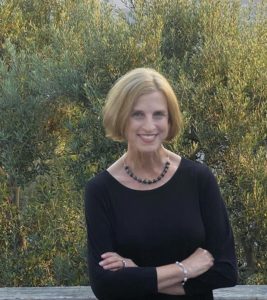 I met Jessica O’Dwyer when we were both MFA students at Antioch. I was immediately taken with her kind and giant heart—and her beautiful writing. Jessica’s award-winning Mamalita tells the story of the adoption of her daughter from Guatemala. Their adoption journey was quite the adventure! (Jessica later adopted a son, also from Guatemala—less of an adventure because she’d learned from her prior experience.) Jessica’s second book, the novel Mother Mother, launched this month. Its tagline: “Two mothers. Two countries. One adoption story.” You can learn more about Jessica on her website. In the meantime, please “listen in” on our conversation. I can’t wait for you to meet Jessica. You will immediately be inspired!
I met Jessica O’Dwyer when we were both MFA students at Antioch. I was immediately taken with her kind and giant heart—and her beautiful writing. Jessica’s award-winning Mamalita tells the story of the adoption of her daughter from Guatemala. Their adoption journey was quite the adventure! (Jessica later adopted a son, also from Guatemala—less of an adventure because she’d learned from her prior experience.) Jessica’s second book, the novel Mother Mother, launched this month. Its tagline: “Two mothers. Two countries. One adoption story.” You can learn more about Jessica on her website. In the meantime, please “listen in” on our conversation. I can’t wait for you to meet Jessica. You will immediately be inspired!
Diane: Thank you for doing this, Jessica! I knew I wanted to interview you because, first of all, I love you. You’re just a great energy. And I was so moved by hearing you read a chapter in the new book when we were both at Antioch. I think you read from the beginning.
Jessica: What was then the beginning. (And I love you, too!)
Diane: Was then the beginning. Yes, I know how that is. And I just finished reading Mamalita. I loved it! You have some amazing story.
Jessica: Oh, that’s so nice of you. Everything that happened did feel amazing. The kind of stuff you couldn’t make up because no one would believe it. Even as I was living the experience, I knew it was unique and worth sharing. I’ve always been a journal keeper, so I kept very detailed notes.
“I Signed Up for a Group Ride Between Christmas and New Year’s—500-Miles Across the Anza Borrego Desert and Down the Coast—Because I Couldn’t Face That Holiday Week Alone.”
Diane: I was going to ask you how you remembered all those details and if you took notes all along. Because I can’t imagine you putting that all together from memory.
Jessica: No, no, not from memory. I kept a journal and took notes after every important conversation. My husband, Tim, was back in California working, and I had moved to Antigua, Guatemala to live with Olivia [the daughter we were adopting]. At night, when Olivia was asleep, before starting my Spanish homework, I’d also write down whatever happened that day. And of course, I saved email correspondence—with our adoption agency, the U.S. Embassy, and with other adoptive parents. It was all primary source material in that book.
Diane: So, you have to repeat the story of you and Tim. Make everybody jealous!
Jessica: Oh, that’s so sweet. I got married when I was 27 and was divorced by age 30. I’d been living in NYC and moved to Los Angeles. Soon after, I went through early menopause. Menopause was pretty life-shaking because I didn’t have children.
I was also an intense bicyclist. By then, I’d moved to San Diego and one year, signed up for a group ride between Christmas and New Year’s—500-miles across the Anza Borrego Desert and down the coast—because I couldn’t face that holiday week alone.
That’s where I met Tim. I thought he was cute, and he was very kind. A truly nice guy. I told him straight off, “By the way, I can’t have children. I’m thinking of adopting.” Tim didn’t miss a beat. He thought adoption was a great idea. We didn’t waste any time.
Her Hubby Bakes Bread!
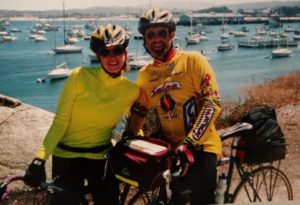 Diane: You forgot to mention the homemade bread.
Diane: You forgot to mention the homemade bread.
Jessica: The bread! Tim lived in San Francisco, and the last day of the ride, asked for my contact information. Every week, he baked a loaf of homemade bread and mailed it to me. Physically mailed it to me. I’d come home from work to find a package sitting on my front steps. We got married soon after.
Diane: Then you began to live the adoption nightmare?
Jessica: I think many adoptive parents say, in retrospect, “The nightmare was what we needed to go through to get to where we are.” That’s the way it is with life.
Diane: I don’t want to give away too much because Mamalita is like a thriller in some ways. It’s definitely a page turner, with so many twists and turns, disappointments and excitements.
Spoiler alert: everything turned out wonderfully at the end. But you went through a lot. I was so impressed by your determination and your courage. When you look back, do you say, “Oh my God, how did I do that?”
Jessica: What I can’t believe is how uninformed and naïve I was. At the time, I didn’t understand the “adoption industry”—and I use that term carefully—or the culture of Guatemala. Now, I understand more about both.
Diane: You found your daughter, Olivia, on an adoption agency website? You saw her picture.
Jessica: She was four months old. We were looking for a baby and there she was.
Diane: And there she was. And you fell in love.
Jessica: We did.
“There Was Never One Moment When We Thought, We Cannot Go Through with This.”
Diane: And you went over and that’s when the craziness began.
Jessica: In Guatemala, unlike in other countries, you were allowed to visit your child before the adoption was final. Of course, as soon as you hold your baby in your arms, that’s it.
Diane: There’s no turning back.
Jessica: After that, there was never one moment when we thought, We cannot go through with this. She was our daughter. We were going to do whatever it took.
Diane: So, from start to finish, how long did it take?
Jessica: Almost two years.
Diane: For people who haven’t read the book, you actually moved to Antigua, Guatemala to speed the adoption along, right?
Jessica: I was working at San Francisco Museum of Modern Art (SFMOMA), and the adoption was dragging on and on. We visited frequently and realized the back and forth between Olivia’s foster mother and me was confusing for everyone. We agreed it would be best for Olivia to attach to one caregiver, and that caregiver was going to be me. I quit my job at SFMOMA, rented an apartment in Antigua, and moved there.
Diane: Wow. And you met Kendra [a character in the book]?
Jessica: Kendra had also moved to Antigua to foster her daughter. When you’re an adoptive parent, but the paperwork hasn’t been signed yet, you call that fostering. There were about eight of us—all women—from across the U.S. We became a community, and we’re still friends.
Diane: That’s wonderful.
“Mamalita Was Published Ten Years Ago, and People Still Reach Out to Me to Share Experiences or Ask Questions”
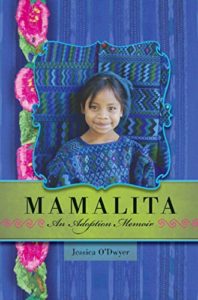 Jessica: In fact, the woman I call Kendra in the book lives 45 minutes away from us.
Jessica: In fact, the woman I call Kendra in the book lives 45 minutes away from us.
Diane: Wow.
Jessica: We see her several times a year. Olivia and her daughter are like sisters. It’s a beautiful thing.
Diane: It is. It is. You said earlier that it was what you needed to go through. Why did you need to go through all that? How do you make sense of that?
Jessica: That’s such a life question. Everything that happened brought our family together, and it feels like the right family.
Diane: Absolutely. I can see that. And it brought you to writing this book that I’m sure has helped a lot of people.
Jessica: I hope it has. It definitely has started conversations in our adoption community—especially about connecting with birth family. Mamalita was published ten years ago, and people still reach out to me to share experiences or ask questions.
Diane: It’s almost like you were put in this situation because you were going to be the one to tell the tale, in some way.
Jessica: The story felt larger than I was. My destiny was to tell the story.
Diane: When Olivia wasn’t bonding to you immediately, when she was defensively holding back and was in confusion a lot of the time—I’m so moved by how you dealt with that.
Jessica: In the beginning, her behavior just felt like rejection. Now, I understand that she’d experienced deep trauma. She couldn’t behave any other way.
Diane: Absolutely.
“Visiting Their Birth Families Every Year Is a Normal Part of Their Lives. It’s Like Any Blended Family”
Jessica: At the core of adoption is loss. Loss of your natural, biological mother. We sometimes assign blame to “adoption,” but so much loss happens before adoption papers are signed. A profound separation that is deeply felt. It can be difficult for a baby or child to trust after losing that primary bond. The impulse is to pull away, to test. I’d never observed that in my sisters and their kids. It was unexpected.
Diane: Even if it was expected, it would have been still incredibly painful.
Jessica: It was painful. But you just keep going.
Diane: Well, you just kept going. But I could imagine a lot of people would have thrown in the towel. It’s a testament to your love for Olivia, and your own strength. And then, you adopted Mateo. And you go back every year to visit. You visit both their mothers?
Jessica: We visit Olivia’s mother and family every summer. Mateo’s mother is more mobile. She’s not available every year when we go.
Diane: You stay for a month in Guatemala?
Jessica: We do. We love Guatemala. We rent a house in Antigua with other adoptive families and travel around the country.
Diane: And what is that like for Olivia and Mateo?
Jessica: It’s what they know. Visiting their birth families every year is a normal part of their lives. It’s like any blended family. Or if you have a parent who travels a lot or lives in a different state, or a parent who is deployed. You grow up that way, so it’s normal for you. That’s the reality.
“People Have Very Strong Opinions About Transracial Adoption”
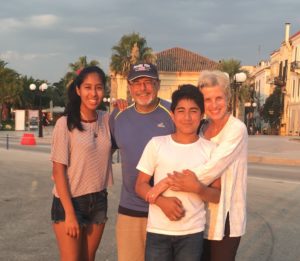 Diane: That’s the reality. How old are the kids now?
Diane: That’s the reality. How old are the kids now?
Jessica: Olivia’s 18. She’s a senior. Mateo is a sophomore, 15.
Diane: Do you ever tire speaking about adoption? You mention in the book, because your coloring is different than your kids’, people would stop you and either make comments or ask questions. Or do you kind of feel like you’re an ambassador for adoption in some ways?
Jessica: I’m passionate about helping people understand adoption and never tire of speaking about it. Ambassador is the right word. And, as you say, people have very strong opinions about transracial adoption.
Diane: And they’re not afraid to share it, right?
Jessica: People are not afraid to share. As my kids get older and move out into the world, they’re the ones who hear comments.
Olivia is K’iche’ Maya, which is one of the indigenous groups in Guatemala. Even among the Hispanic or Latinx community in California, people notice Olivia because she’s indigenous.
Diane: People will just say, “What are you?”
Jessica: Exactly that. In our area, many people are Spanish speakers. People come up to Olivia—
Diane: And start speaking Spanish.
Jessica: All the time.
Diane: Does she speak Spanish?
Jessica: She does. In Guatemala, they attend Spanish school, and in school here.
Diane: So they keep it up. How does Olivia feel about that?
Jessica: Olivia is proud to speak Spanish. She wishes I were a native Spanish speaker and spoke more fluently. Her life would be easier if I were also Guatemalan. The regular identity issues young people go through are amplified. I think that’s true for many children who are adopted and especially people in transracial adoptive families.
“Clean Drinking Water … What a Privilege. We Turn on the Faucet and Clean Water Comes Out”
Diane: It’s like this triple whammy, right? Of identity. But hey, when you get through it, you probably really know who you are.
Jessica: Olivia is extraordinarily self-aware. She’s very perceptive. I call her an old soul. Through her own journey, Olivia’s learned how to be an empathic human being.
Diane: Now one of the things you mentioned in the book was how spoiled we are. When you go to a country that has so little, where the people have so little, it’s like, how dare we ever complain about anything?
Jessica: I call myself spoiled, and maybe the reader can identify.
Diane: Okay. Well, I signed on. We have so much. Things you don’t even think of.
Jessica: Clean drinking water, for example. What a privilege. We turn on the faucet and clean water comes out. There was not one moment in Guatemala where I could turn on a faucet and drink the water. And that’s something we take for granted here in the United States.
Diane: That must have been a real adjustment. There were adjustments on so many levels when you went there.
Jessica: The rules of engagement were different, and I wasn’t prepared for that.
Diane: How could you be, really?
So, let’s move to your new exciting news. Your book, I don’t know, how new is it? How long did you work on it?
Jessica: On and off for seven years.
Diane: Seven years. Oh, wow. So how many agents did you go through?
Jessica: I pitched 90 literary agents.
Diane: I love it.
“The Narrative is Told in Two Voices: The White Adoptive Mother in California and the Indigenous Ixil Maya Mother Whose Son She Adopts”
Jessica: I always heard you needed to be rejected by 100 literary agents before going to plan B, which was to find a small press or self-publish.
Diane: I hadn’t heard that.
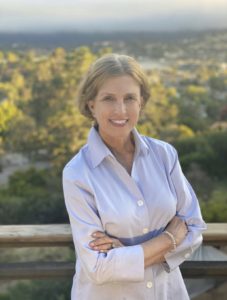 Jessica: And, as you know, if you’ve ever pitched a book, pitching an agent is a careful process. It’s not doing an internet search for agents and sending out a form letter.
Jessica: And, as you know, if you’ve ever pitched a book, pitching an agent is a careful process. It’s not doing an internet search for agents and sending out a form letter.
Diane: So, explain that because a lot of people don’t know.
Jessica: There are thousands of literary agents. You want to find one who has an interest in your subject or theme, or a connection to you, and you tailor your pitch specifically to them.
The agents who responded said, “You’re a talented writer, but this project isn’t for us.” After rejections from 90 agents—as I closed in on the magic number of 100—I started to pitch small presses that didn’t require a literary agent. And right away, Loyola University in Maryland said yes.
Diane: That’s so wonderful. So now what’s the process?
Jessica: We had a few hiccups along with the rest of the world with Covid-19. The book launched on October 1.
Diane: Oh, how exciting is that? So, tell us just a little bit about the book and the inspiration for it.
Jessica: The tagline is “Two mothers. Two countries. One adoption story.” The narrative is told in two voices: the white adoptive mother in California and the indigenous Ixil Maya mother whose son she adopts.
“I Was a Prolific Letter Writer, a Passer of Notes in School, the Kid Who Started Keeping a Journal at Age Ten”
The inspiration came from traveling often to Guatemala, reading exhaustively about it, and living with adoption 24/7 in my own family. Then one summer, we hired a driver who took us to Nebaj and Rabinal, in the highlands of Guatemala, the epicenter of the country’s 36-year armed conflict. It turned out our driver had been a little boy during those hard times. He took us to memorials and graveyards, churches and village squares. We met other people who’d lived through the conflict and visited the incredible museum in Rabinal. Everything came together in my mind. The beginning and end of the novel, the entire narrative arc.
Diane: What’s it like writing a book for seven years?
Jessica: The honest answer? Very isolating. Life happens and there are things you must do, want to do—for me, that was my kids, their school and well-being, my family and extended family. But almost everything else you say “no” to. I’ll give a shout-out to the Antioch MFA program here. They helped me cross the finish line. In the end, you have to be relentless.
Diane: Were you always interested in writing fiction?
Jessica: I was always interested in writing anything. I was a prolific letter writer, a passer of notes in school, the kid who started keeping a journal at age ten. My first published piece was a short story in my college literary magazine. After college, to pay the rent, I supported myself on the editorial staffs of several magazines in NYC and as an art museum publicist in California, banging out hundreds of press releases. I’ve written my whole life.
“I Don’t Know If I’ll Ever Exhaust the Subject of Adoption Because I Think It’s the Most Profound Story on Earth”
Diane: What’s the next story?
Jessica: I don’t know if I’ll ever exhaust the subject of adoption because I think it’s the most profound story on earth. Diane, wasn’t your mother adopted somehow?
Diane: She had lived in an orphanage and then she was “adopted” at 14, but she was really like a family slave.
Jessica: I read your blog and it’s fascinating that one of the only details I know about your mother is that she lived in an orphanage. You led with that detail, and it confirmed for me what I believe. Which is that adoption is the core issue of a person’s life.
Diane: Oh, totally. Totally. And I do believe that we each have a core story, and whenever you try to get away from it, it shows its head. It pops up.
Jessica: So true. There’s a core issue we can’t escape.
Diane: I have one more thing I wanted to explore with you and that is pushback. As a white privileged woman writing about “the other,” you’ve received some pushback, yes?
Jessica: Yes.
Diane: What did that feel like, and what was it like? And what do you anticipate as the book comes out?
Jessica: Many people have strong opinions about transracial adoption overall. Many people have strong opinions about transracial families, not only through adoption, and for different reasons.
Diane: That’s right.
“Mother Mother is Not the First Novel to Explore Adoption as a Theme. It’s Simply My Attempt at Conveying Truths I Believe after Nearly Two Decades of Lived Experience”
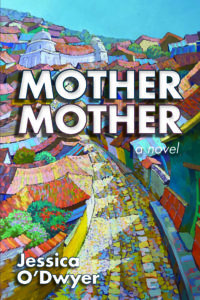 Jessica: And many people, especially other writers, have strong opinions about who has a right to tell what story. Which I understand. I deeply respect the need to walk the walk and do your research. Adoption is incredibly complex in any situation. Add the international element and multiply by ten. To capture that complexity, I needed more than one voice, I needed to create a chorus of voices: the adoptive mother, the birth mother, the person who is adopted, and everyone in the constellation around those characters.
Jessica: And many people, especially other writers, have strong opinions about who has a right to tell what story. Which I understand. I deeply respect the need to walk the walk and do your research. Adoption is incredibly complex in any situation. Add the international element and multiply by ten. To capture that complexity, I needed more than one voice, I needed to create a chorus of voices: the adoptive mother, the birth mother, the person who is adopted, and everyone in the constellation around those characters.
Mother Mother is not the first novel to explore adoption as a theme. It’s simply my attempt at conveying truths I believe after nearly two decades of lived experience. Other writers will come forward to express their own truths. I encourage these stories. I welcome them.
Diane: You have the integrity and can just stand in that. You can’t control what everybody else makes of it.
Jessica: I hope I’ve done my due diligence.
Diane: Absolutely. And it’s wonderful to get a look into the culture through your eyes and see the experience through your eyes. So thank you.
Jessica: Thank you, Diane. Thank you so much for reading Mamalita.
Diane: Oh, I loved it.
Jessica: Thank you. And I hope you like Mother Mother.
Diane: I know that I will!
So, you had a wedding anniversary recently? I saw on Facebook.
Jessica: We did.
Diane: Does he still bake bread?
Jessica: He bakes less bread than he used to.
Diane: Very diplomatic, I love it. Because he will be reading.
Jessica: But he’s still an amazing husband and an amazing cook.
Diane: Okay, well, that’s a wonderful place to end.
Jessica: I enjoyed your questions. Thank you again!
As always, I’d love to hear your thoughts! Please post a comment or send me an email.
See you November 2nd!
XOXO
Diane

Le farmacie online sono diventate un elemento fondamentale del sistema sanitario in Italia, offrendo ai cittadini un accesso più facile e veloce ai medicinali e ai prodotti per la salute. Man mano che la tecnologia digitale continua a evolversi, anche l’industria farmaceutica si sta adattando, con un crescente trend verso i servizi online.


It was such a treat to read this conversation between you, Diane, and Jessica, while I drank my coffee 🙂 As soon as I started reading Mamalita, some time ago, I knew I was in the hands of a gifted writer; Jessica’s prose is precise, descriptive, vivid, and funny. I read a chapter to my husband during a road trip & he loved the story too. Jessica’s characterization is so brilliant that when I met Tim at our MFA graduation ceremony, he was absolutely the lovely man I’d imagined him to be. I had the great privilege of also meeting their two gorgeous children.
Mother Mother is on its way to me now, & I know it will be another page turner. Jessica’s wisdom, knowledge, love, warmth, & humility shine both on the page & in person. Brava Jessica! And thank you, Diane!
What a wonderful assessment Sarita!! I can’t agree more, and I’m also looking forward to diving into Mother Mother. Thanks for your thoughtful comments!
Sarita, thank you! I so appreciate your generous words, more than I can say. Thank you again!
WOW! Another great blog!! Thank you to Jessica for sharing the story! I remember she was reading at the first brown bag lunch I went to at Antioch. It was marvelous!
Thanks, Janet! Jessica is definitely not only an amazing writer but a terrific reader too!
Thank you so much for reading, Janet. Agree about Diane’s blog posts. Among her infinite number of talents: great interviewer!
Also: Diane, my son reminded me he’s a freshman in high school, not a sophomore (!). Which of course I know, yet … somehow forgot? So stating here for the record. 15 and a freshman. Thanks!
Nicky, Wonderful to hear our conversation resonated for you. Yes, continue writing!
And Diane, thank you for your thoughtful questions and chat. I so enjoyed this experience, and always love to read your writing. Thank you, thank you!
Diane and Jessica – this was a wonderful interview. I could tell how much love you have
for one another. I liked all the insights about adoption, especially the one that after trauma, the impulse is to pull away. Pulling away is a human response that is often needed for survival and changing human responses that are felt this deeply is difficult indeed. I understand this more clearly now. I have always been fascinated with the process of adoption. And in addition, the interview encouraged me to continue writing! Thank you both!
Thank you, Nicky, for your comment!
Having just had your own book published about your experience with psychoanalysis, I’m not surprised Jessica’s insights on trauma resonated with you!